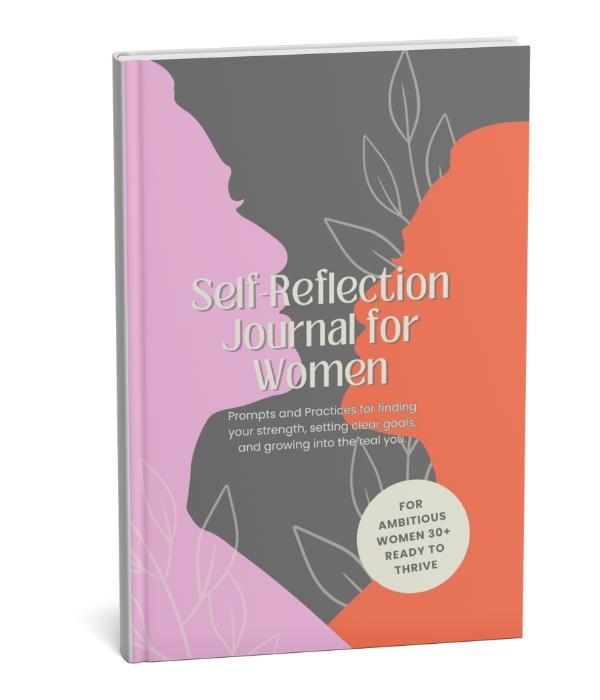Table of Contents
I used to tell myself I’d be happy when things fell into place — the perfect relationship, enough money to buy a car I liked, a lovely apartment, clothes that finally felt like me.
And then, I got most of those things. But it was never enough. I always wanted more.
If you’ve ever caught yourself thinking “I’ll be happy when…” or “I’ll love myself once…” then you know the exhausting cycle of conditional self-love. This is the story of how I broke free from that trap and discovered what unconditional self love actually means — and how you can too.
The truth is: Your worth isn’t waiting for you in the future. It’s here now, beneath all the conditions you’ve placed on it.
My Breaking Point with Conditional Self-Love
Then came the turning point — I left my home country in my thirties, tried to live off my savings, and started something new. A business, a new version of myself, a “freedom lifestyle,” whatever that was supposed to mean. But nothing moved. I worked late nights. My projects didn’t launch. My savings quietly disappeared, and I found myself in a new country, completely alone. No partner. No close friends. No success story to post online.
That’s when the voice crept in: Am I just… worthless?
Why can other people build beautiful lives, run successful businesses, and thrive — while I’m stuck, lost, and starting over?
It was a dark place. But instead of letting it consume me, I turned inward. Slowly. Gently. I began asking different questions:
- What do I actually have to offer?
- What makes me worthy, even when I have nothing to show for it?
And through that painful, quiet unraveling, I realized something: I’ve always been enough. I just forgot. I was too busy proving, performing, pretending.
This was my first glimpse of what unconditional self love could look like — loving myself not because of what I achieved, but simply because I exist.

What Is Conditional Self-Love? (And Why It’s So Dangerous)
Conditional self-love is the belief that you’re only worthy if you meet certain standards — success, appearance, status, productivity, perfection. It often sounds like:
- “I’ll love myself when I make more money.”
- “I’ll feel good about myself once I’m in a relationship.”
- “I’ll be enough when I finally lose the weight / get promoted / have it all together.”
It’s a trap. Because the moment you reach one goal, your mind moves the finish line. And deep down, that old belief is still running the show: I’m not enough yet.
Where Conditional Self-Love Begins
For me, this mindset started way back in childhood. I never felt truly supported by my parents or relatives. Instead, I was constantly compared — my room wasn’t tidy enough, my behavior wasn’t quiet enough, my dress was always torn when others looked polished and perfect.
So I worked hard to prove my worth: get good grades, go to university, get the “right” job. I thought if I did everything perfectly, I’d finally be lovable.
But that wasn’t self-worth — that was performance. And performance-based self-love is exhausting.
The Psychology Behind “I’ll Be Happy When” Thinking
According to research in psychology, this pattern is incredibly common. We’re conditioned from early childhood to believe that love and acceptance must be earned through good behavior, achievements, and meeting others’ expectations.
The real danger of conditional self-love: It ties your worth to circumstances you can’t fully control. You’re only okay if things are going okay. If the relationship ends, the job is lost, or your body changes — suddenly, your self-esteem collapses.
It’s like living on a rollercoaster, always one failure away from feeling worthless again.
And society doesn’t help. We’re constantly bombarded with messages that say our value lives outside of us: Perfect feeds. Productivity culture. Endless “glow-up” trends. You’re told you need to be more to be lovable.
So it’s no wonder so many of us — especially women — internalize this. We grow up believing we have to earn our worth. That we’re only as good as our latest achievement or the approval we receive.
But what if that wasn’t true?
The Hidden Costs of Living with Conditional Self-Worth
Living with conditional self-love doesn’t always feel dramatic on the surface. You might still be achieving things, checking off goals, even looking “successful” to others. But underneath it all, something feels… off.
And that quiet emptiness starts to show — in subtle but powerful ways.
You Miss the Present Moment
When your worth is always waiting in the future, you can’t fully experience the present. Even the good moments feel like pit stops — not destinations.
You get the job, the trip, the relationship… and instead of joy, there’s pressure: “What’s next?”
It’s hard to slow down and feel proud of yourself when your inner voice is already moving the bar again.
You Treat Yourself Like a Project, Not a Person
When your self-love is earned, not given freely, you turn into your own fixer. You’re constantly trying to improve, optimize, correct.
It’s sneaky, because growth is beautiful — but when it’s driven by self-rejection, it becomes a form of self-punishment.
Instead of asking, “How can I support myself today?” You’re stuck in, “What’s wrong with me — and how do I fix it?”
You Chase Achievements But Lose Your Inner Voice
You measure your days by what you did, not how you felt. You struggle to rest without guilt. You feel uneasy when you’re not being productive.
Over time, this disconnect pulls you away from your desires, your needs, your voice — Because you’re always performing for someone else’s idea of success.
Self-Love Becomes Performance, Not Practice
You show the world a version of yourself that’s polished, in control, and “enough.” But deep down, you might feel like a fraud — still waiting for that magical moment when you finally feel worthy.
And that moment never comes. Because real unconditional self love isn’t something you perform. It’s something you practice — especially on the messy days.
From Earning Worth to Owning It: The Shift to Unconditional Self-Love
Unconditional self love doesn’t mean giving up. It doesn’t mean saying, “Well, this is who I am, take it or leave it.” It’s not laziness. And it’s definitely not settling.
It’s about learning to stand in your own corner — even when things aren’t perfect. Even when you’re messy, lost, confused, or in the middle of a big, beautiful breakdown.
Unconditional self love is being rooted while still growing. It’s saying, “I’m a work in progress… and I’m still worthy right now.”
That’s the shift.
The Science of Self-Image and Worth
Dr. Maxwell Maltz, in his groundbreaking book Psycho-Cybernetics, talked about how your self-image — the mental blueprint of who you believe you are — shapes everything.
If your inner story still says, “I’m not enough,” then no amount of success, glow-ups, or approval will land. You’ll always feel like you’re faking it.
But when you start nurturing your self-image now, without waiting for things to be “better,” that’s when everything begins to shift.
- You stop chasing love — and start giving it
- You stop performing — and start showing up
- You stop postponing your life — and begin actually living it
Unconditional self-acceptance is not the end of your growth — it’s the soil it grows in.
When you’re no longer hustling for your own worth, you create space. For softness. For peace. For your actual self to take up space — not the version you think you need to become.
5 Practical Tools to Rewire Your Self-Worth
Changing your self-worth story isn’t a one-time breakthrough. It’s not something you read once in a book or hear in a podcast and suddenly — boom — healed.
It’s a practice. Something you come back to daily, even when you don’t feel like it. Especially then.
Here are five tools that helped me develop unconditional self love, and might just shift something in you too:
Tool 1: Journaling for Self-Discovery, Not Perfection
Don’t overthink it. Just write what’s true.
Here’s a prompt that shook me the first time I answered it:
“What would I do differently if I already believed I was enough?”
Not once I lose weight. Not once I launch that project. But now.
Additional journaling prompts for unconditional self love:
- What stories about my worth did I learn in childhood?
- When do I feel most like myself?
- What would I tell my younger self about their inherent value?
- How can I show myself compassion today?
Sometimes your pen knows the way before your mind catches up.
Tool 2: Mirror Work That Actually Works
Look at yourself. Like, really look. And say one sentence you would tell someone you deeply love.
Start small:
- “You’re doing better than you think.”
- “I see how hard you’re trying.”
- “You are enough — not someday, right now.”
If saying it feels cringey, whisper it. If whispering is too much, just hold eye contact with compassion. That alone is a radical act of unconditional self love.
Tool 3: Visualization for Self-Worth (The Maltz Method)
Dr. Maxwell Maltz taught that your brain doesn’t know the difference between a real memory and a vividly imagined one. So use that.
Each morning, take one minute (yes, just one) to visualize yourself already embodying self-worth. Not in a fake, ego-boosting way — but really imagine:
- How would you walk?
- What would you say no to?
- How would you treat your body?
- How would you show up in a room?
You’re not imagining the future you. You’re remembering the real you — beneath the conditioning.
Tool 4: Catching the “When… Then” Trap
Start noticing the language of delay.
- “I’ll feel confident when I…”
- “I’ll finally rest once I…”
- “I’ll love myself when I…”
Every time that voice shows up, gently flip the script:
Not: “I’ll love myself when I’m successful.” But: “Loving myself now is what will help me create real success.”
It’s not toxic positivity. It’s reprogramming the loop toward unconditional self love.
Tool 5: Daily Self-Worth Rituals
You don’t need a whole ceremony. Start here:
- Celebrate one small win each day (yes, getting out of bed counts)
- Unfollow one account that makes you feel “less than”
- Say no when you mean no, even if your voice shakes
- Wear clothes that feel like you, not the “better version” of you
- Keep a “proof list” — every time you do something brave, honest, or aligned, write it down
These tiny choices become evidence. And that evidence rewires your identity toward unconditional self love.
Signs You’re Developing Unconditional Self Love
As you practice these tools, you’ll start noticing shifts:
Internal Changes:
- You feel calmer about your “flaws” and imperfections
- Your inner critic becomes less harsh and more constructive
- You can rest without guilt or anxiety about productivity
- You celebrate small wins instead of only focusing on big achievements
- You trust your instincts and make decisions from self-respect
External Changes:
- You set boundaries more easily and without over-explaining
- You’re less triggered by others’ success or opinions
- You choose relationships and opportunities that align with your values
- You express yourself more authentically in conversations and creativity
- You take better care of your physical and emotional needs
Your Journey to Unconditional Self Love Starts Now
Here’s what I want you to remember: You don’t have to earn unconditional self love. You don’t need more proof, more hustle, more perfection to deserve it.
Your worth isn’t a reward. It’s a return — to who you were before the world told you otherwise.
And yes, sometimes that return is quiet. Messy. Slow. But it’s yours.
As Maxwell Maltz wisely said: “Low self-esteem is like driving through life with your handbrake on.”
Let this be the moment you start releasing the brake.
A Powerful Practice to Begin Today
If I already saw myself as worthy, how would I show up differently today?
Write without editing. Let it surprise you. And if all that comes up is, “I’d finally exhale” — that’s enough.
That exhale is the beginning of unconditional self love.
Frequently Asked Questions About Unconditional Self Love
What’s the difference between self-esteem and unconditional self love? Self-esteem often fluctuates based on performance and external validation. Unconditional self love is a steady foundation of self-acceptance that remains constant regardless of circumstances or achievements.
Isn’t unconditional self love just being lazy or settling? Not at all. Unconditional self love actually creates the safety and confidence needed for healthy growth. When you’re not constantly fighting your own worth, you have more energy for meaningful goals and authentic improvement.
How long does it take to develop unconditional self love? It’s an ongoing practice rather than a destination. You might notice small shifts within weeks, but developing deep unconditional self love often takes months or years of consistent practice — and that’s perfectly normal.
What if I was raised in a very critical environment? Many people with critical upbringings struggle with conditional self-love patterns. This makes unconditional self love more challenging but also more transformative. Consider working with a therapist alongside these practices for additional support.
How do I maintain unconditional self love during failures or setbacks? Remember that unconditional means “without conditions” — including the condition that everything goes well. Practice self-compassion during difficult times, treat yourself as you would a good friend, and remember that your worth exists independently of temporary circumstances.
Can I have unconditional self love and still want to improve myself? Absolutely! In fact, unconditional self love often makes positive change easier because you’re growing from a place of self-acceptance rather than self-rejection. You can love yourself as you are AND want to evolve — these aren’t contradictory.
Remember: Unconditional self love isn’t a luxury — it’s the foundation for everything else.
When you stop driving through life with your handbrake on, you’ll be amazed at how far you can go.
Ready to start your unconditional self love journey? Download my Self-Worth Recovery Journal with daily prompts and practices to help you break free from conditional thinking and embrace your inherent














0 Comments